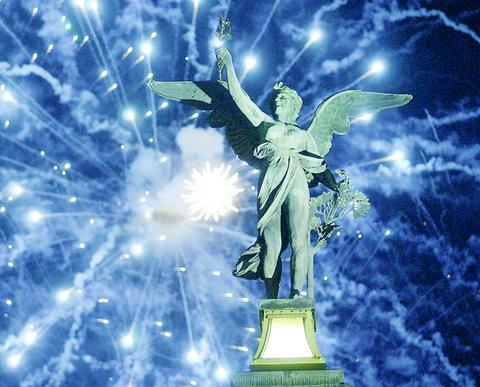With a blaze of fireworks and street celebrations, the EU threw open its gates to 10 new members yesterday, reuniting a continent scarred by decades of Cold War conflict.
Hundreds of thousands thronged open-air parties, concerts and border ceremonies from the Atlantic to the Baltic and the Mediterranean as political leaders hailed the final closing of Europe's east-west divide, 15 years after the Berlin Wall fell.

PHOTO: EPA
Star-studded blue EU flags were hoisted in eight central and eastern European states that endured decades of Soviet-dominated communist rule, and on the Mediterranean islands of Cyprus and Malta, which join the wealthy 15-nation west European bloc.
"Ladies and gentlemen, we are making history ... Today our dream is becoming reality. Poland is returning to its European family," President Aleksander Kwasniewski told crowds in central Warsaw at a midnight flag-raising ceremony.
But a group of Polish Euro-sceptics heckled him. And in Prague, Czech President Vaclav Klaus, a longtime EU critic, gave a sour television address, saying Czechs would have to master Brussels' bureaucratic ways while preserving their identity.
More than 100,000 revellers thronged central Budapest, feting their return from the cold with fireworks, music and champagne, and Prime Minister Peter Medgyessy declared that "Hungary has returned to Europe ... It has deserved it, 10 million people have worked for it."
Crowds of tens of thousands rejoiced in Prague and Vilnius.
Leaders of the new 25-nation bloc, representing 450 million citizens, held a ceremonial summit in Dublin later yesterday to mark the birth of the world's biggest trading bloc, rivalling the US.
For East Europeans in Poland, the Czech Republic, Slovakia, Hungary, Slovenia, Estonia, Latvia and Lithuania, enlargement crowns 15 years of often painful economic reforms since the collapse of communist rule.
In Brussels, headquarters of the EU, ambassadors of the 10 newcomers attended an emotional ceremony in the historic Grand' Place in which a spotlight picked out their flags one by one on the balcony of city hall as some 3,000 revellers cheered.
"We are all Europeans now," an announcer declared.
One of the fathers of European reunification, a tearful former German Chancellor Helmut Kohl, told thousands at a ceremony in Zittau on the German-Czech-Polish border: "The message is there will never again be war in Europe."
Rejoicing was more muted in Cyprus after split referendums last Saturday meant the Greek Cypriot south of the island joins the EU despite rejecting a UN peace plan, while the Turkish Cypriot north remains outside it despite voting "yes."
Also See Story:
US asleep as EU expands its membership eastward

Auckland rang in 2026 with a downtown fireworks display launched from New Zealand’s tallest structure, Sky Tower, making it the first major city to greet the new year at a celebration dampened by rain, while crowds in Taipei braved the elements to watch Taipei 101’s display. South Pacific countries are the first to bid farewell to 2025. Clocks struck midnight in Auckland, with a population of 1.7 million, 18 hours before the famous ball was to drop in New York’s Times Square. The five-minute display involved 3,500 fireworks launched from the 240m Sky Tower. Smaller community events were canceled across New Zealand’s

The Ministry of Foreign Affairs (MOFA) yesterday said it is closely monitoring developments in Venezuela, and would continue to cooperate with democratic allies and work together for regional and global security, stability, and prosperity. The remarks came after the US on Saturday launched a series of airstrikes in Venezuela and kidnapped Venezuelan President Nicolas Maduro, who was later flown to New York along with his wife. The pair face US charges related to drug trafficking and alleged cooperation with gangs designated as terrorist organizations. Maduro has denied the allegations. The ministry said that it is closely monitoring the political and economic situation

‘SLICING METHOD’: In the event of a blockade, the China Coast Guard would intercept Taiwanese ships while its navy would seek to deter foreign intervention China’s military drills around Taiwan this week signaled potential strategies to cut the nation off from energy supplies and foreign military assistance, a US think tank report said. The Chinese People’s Liberation Army (PLA) conducted what it called “Justice Mission 2025” exercises from Monday to Tuesday in five maritime zones and airspace around Taiwan, calling them a warning to “Taiwanese independence” forces. In a report released on Wednesday, the Institute for the Study of War said the exercises effectively simulated blocking shipping routes to major port cities, including Kaohsiung, Keelung and Hualien. Taiwan would be highly vulnerable under such a blockade, because it

UNRELENTING: China attempted cyberattacks on Taiwan’s critical infrastructure 2.63 million times per day last year, up from 1.23 million in 2023, the NSB said China’s cyberarmy has long engaged in cyberattacks against Taiwan’s critical infrastructure, employing diverse and evolving tactics, the National Security Bureau (NSB) said yesterday, adding that cyberattacks on critical energy infrastructure last year increased 10-fold compared with the previous year. The NSB yesterday released a report titled Analysis on China’s Cyber Threats to Taiwan’s Critical Infrastructure in 2025, outlining the number of cyberattacks, major tactics and hacker groups. Taiwan’s national intelligence community identified a large number of cybersecurity incidents last year, the bureau said in a statement. China’s cyberarmy last year launched an average of 2.63 million intrusion attempts per day targeting Taiwan’s critical